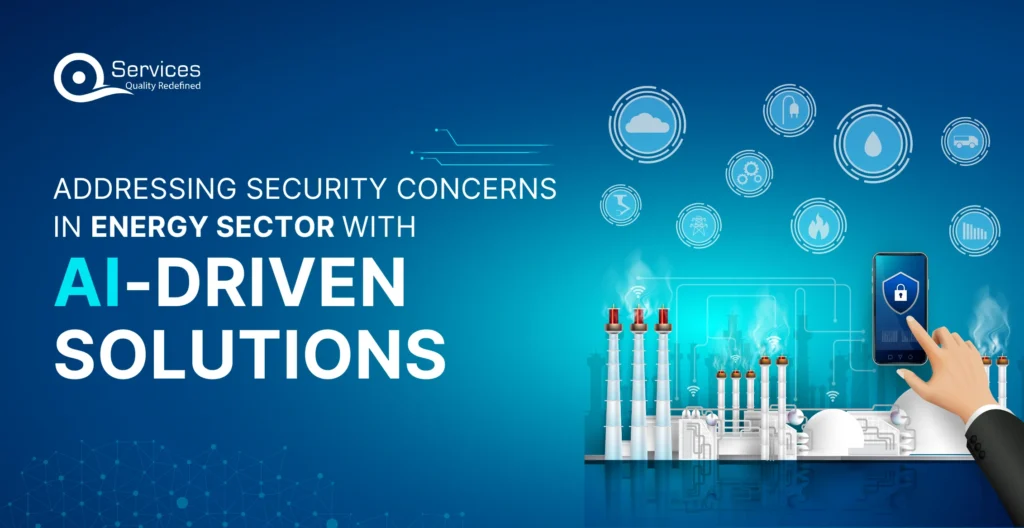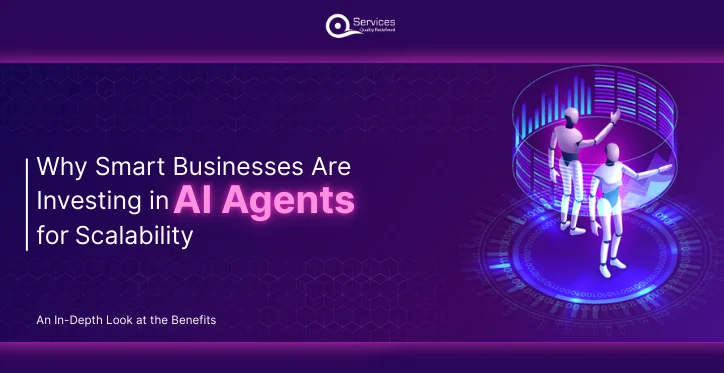
Rewards
.





CANADA
55 Village Center Place, Suite 307 Bldg 4287,
Mississauga ON L4Z 1V9, Canada
Certified Members:
.



Home » Addressing Security Concerns in Energy Sector with AI-Driven Solutions

In today’s digital age, the energy sector faces growing security threats, from cyberattacks to physical sabotage. How can energy companies protect themselves from these dangers? What role can advance technologies, like Artificial Intelligence in energy market, play in ensuring safety and reliability?
AI-driven solutions offer powerful tools to counteract security challenges, providing real-time monitoring, predictive analytics, and automated threat responses. Consider Singapore’s smart grid project, which uses AI to optimize energy distribution, reduce losses, and enhance reliability, resulting in a 15% reduction in energy wastage. Imagine the security benefits if similar AI strategies were widely adopted.
This blog explores the critical role of AI in addressing security concerns in the energy sector. From cybersecurity to operational efficiency, we’ll uncover how AI in energy can transform security. If you’re looking for comprehensive insights and practical solutions, this blog might be your ultimate guide. Join us as we explore the future of energy security through AI.
Cyber-attacks are a significant threat to the energy sector, targeting critical infrastructure and operational technology. These attacks can be highly sophisticated, often leveraging vulnerabilities in software, hardware, and network systems.
Attackers encrypt critical data and demand a ransom for its release. This can disrupt operations and result in significant financial losses.
Deceptive emails or messages trick employees into revealing sensitive information, leading to unauthorized access and potential breaches.
Overload systems with traffic, causing service outages and operational disruptions.
Long-term, targeted attacks that stealthily infiltrate networks to extract sensitive data or disrupt operations.
Cyberattacks have the potential to interfere with the production, delivery, and management of energy, resulting in low reliability and outages.
The compromise of private or sensitive information that affects the business and its clients, such as operational and personal data.
Prolonged legal fees, substantial recovery costs, and possible regulatory fines.
Reputational damage is the erosion of credibility and confidence among stakeholders and clients.
Get free Consultation and let us know your project idea to turn into an amazing digital product.
Physical threats encompass attacks on physical infrastructure, including power plants, substations, pipelines, and other critical assets. These threats can be executed by individuals or groups with malicious intent.
deliberate damage to equipment or facilities, leading to operational disruptions.
Targeted attacks intended to cause significant damage, fear, or disruption.
stealing valuable equipment or materials, which can impact operational capabilities and increase costs.
Physical destruction of infrastructure leads to repair and replacement costs and potential service outages.
Temporary or extended shutdowns of facilities affect energy production and distribution.
Enhanced measures and monitoring systems are required to prevent and respond to physical threats.
Physical attacks can pose serious risks to public safety, especially in densely populated areas.
Operational inefficiencies stem from outdated technology, ineffective management practices, and inadequate monitoring systems. These issues can severely compromise the security and reliability of energy infrastructure, increasing vulnerability to threats and operational disruptions.
Legacy systems often lack contemporary security measures, making them prime targets for cyber-attacks and other security breaches.
Subpar procedures for system monitoring, incident response, and maintenance can exacerbate vulnerabilities, leaving systems more exposed.
Insufficient surveillance and analytics capabilities can delay the detection of potential threats and anomalies, resulting in slower response times.
Inefficiencies can create security gaps, making it easier for attacks and system failures to occur.
Operational problems can cause frequent outages, lower efficiency, and overall worse performance.
Costs can rise due to emergency fixes, repairs, and upgrades needed because of operational failures.
Not meeting industry standards and regulations can lead to legal penalties and fines.
Artificial Intelligence (AI) is revolutionizing the way industries handle security, and the energy sector is at the forefront of this transformation. As energy systems grow increasingly complex and interconnected, traditional security measures are proving insufficient. Artificial Intelligence in energy and utilities introduces a new level of sophistication, equipping energy companies with tools to effectively identify, prevent, and respond to security threats. By harnessing AI, these companies can significantly bolster their defenses, streamline operations, and ensure consistent and reliable service delivery.
AI’s predictive analytics offer a proactive approach to security through data-driven energy solutions. By examining historical data and recognizing patterns, AI can forecast potential vulnerabilities and issues before they arise. This foresight enables energy companies to address potential problems early, reducing the likelihood of downtime and minimizing security risks.
AI is particularly skilled at recognizing unusual behaviour, which is crucial for spotting security threats. In the energy sector, it helps monitor system performance, detect unauthorized access, and identify anomalies that could signal a potential security breach. For example, AI can sift through network traffic to detect odd patterns that might indicate a cyber-attack or unauthorized entry.
AI-powered real-time monitoring provides ongoing surveillance and immediate analysis of energy systems. This means threats or system failures can be detected quickly, allowing for fast action. AI processes data from sensors and other sources to send instant alerts and insights, helping to prevent security issues and keep operations running smoothly.
One of AI’s greatest strengths is its ability to automatically respond to threats. AI systems can take predefined actions to address risks, like isolating affected systems, blocking harmful traffic, or alerting human operators. This automation speeds up response times and lessens the impact of security incidents, making the energy infrastructure more robust and reliable.
As energy infrastructure evolves with digital integration, AI energy solutions are essential for enhancing security. Here’s a clear breakdown of how AI is transforming energy security across different dimensions:
AI is highly effective at spotting and countering cyber threats. It analyzes extensive data from network activities and user behaviors to identify potential dangers like malware or phishing attempts. For instance, AI systems continuously scan network traffic for irregular patterns and can flag suspicious activities early, helping to prevent breaches before they escalate.
AI enhances cybersecurity by providing real-time monitoring of energy infrastructure. It processes data from various sources, such as sensors and network logs, to spot unusual activities that might signal a security breach. This immediate detection allows for quick action, such as isolating compromised systems or blocking harmful traffic, thus protecting against potential damage
AI-driven surveillance systems boost physical security by continuously analyzing video feeds and sensor data for unusual activities. Utilizing machine learning in energy, these systems detect deviations from normal behavior, such as unauthorized access or suspicious movements. For example, AI can review security camera footage to spot potential intrusions in restricted areas, enhancing the protection of physical assets.
AI strengthens physical security through predictive maintenance, which forecasts equipment failures or threats before they occur. By analyzing historical data and real-time conditions, AI can predict when maintenance is needed or identify potential issues. This proactive approach allows for early intervention, reducing the risk of security breaches related to physical infrastructure.
AI improves operational efficiency by optimizing how energy is distributed. It analyzes data from various sources, such as weather forecasts and consumption patterns, to manage energy loads effectively. This optimization helps prevent system overloads, reduces operational risks, and minimizes energy waste.
AI enhances grid security and resilience by continuously monitoring real-time data from the grid. It identifies potential problems and anomalies, allowing for automated responses to maintain grid stability. By predicting disruptions and coordinating recovery efforts, AI ensures reliable energy delivery, even during challenging conditions.
AI Applications in the Oil and Gas Industry are transformative. From predictive maintenance of equipment to real-time monitoring of pipeline integrity, AI helps manage the vast and complex systems involved. It enhances safety by detecting potential leaks or faults early and optimizing operations to prevent downtime.
AI-driven solutions are revolutionizing energy security by offering advanced tools to address cyber and physical threats, improve operational efficiency, and enhance overall resilience. By integrating AI into their strategies, energy organizations can safeguard their infrastructure, optimize operations, and ensure continuous and reliable energy services.
Integrating AI into energy security comes with various challenges and considerations. Here’s a simplified overview:
AI needs accurate, high-quality data to work effectively. However, combining data from different sources can be tricky and errors or gaps in the data can affect AI performance. It’s important to manage and verify data carefully to ensure reliable AI results.
AI systems must handle growing amounts of data and adapt to new threats. As energy infrastructure evolves, AI solutions need to grow and adjust accordingly. Ensuring that AI can scale up and stay relevant is key to its success.
AI in energy security must meet various laws and industry standards, such as data protection and cybersecurity regulations. Staying up to date with these rules and working with experts is necessary to avoid legal issues and ensure best practices.
AI decisions can impact people and organizations, raising ethical concerns like bias and fairness. It’s crucial to make AI systems transparent and accountable to address these issues and build trust.
AI deals with a lot of sensitive information, so it’s important to protect this data from breaches and unauthorized access. Using encryption, secure storage, and regular security checks can help safeguard data.
Keeping data accurate and private involves updating AI systems, securing data storage, and monitoring access. Techniques like data anonymization can also help keep information confidential while allowing AI to work effectively.
Deploying AI in energy security involves managing technical issues, ethical concerns, and data privacy. By addressing these challenges, energy organizations can use AI to improve security, optimize operations, and protect their infrastructure.

AI is revolutionizing energy security in several key areas:
AI is driving automation in energy management through innovations like Virtual Power Plants and Energy as a Service. By leveraging AI in energy management, these technologies streamline energy use and adapt to changing needs, making energy systems more efficient and responsive.
As AI becomes more involved in generating content and making decisions, it’s crucial to understand how these systems work. Clear insights into AI decision-making processes build trust and ensure ethical use.
Creating strong guidelines for AI deployment in energy security is essential. These policies ensure that AI systems operate ethically, protect data privacy, and adhere to regulatory standards.
Assessing potential risks from AI and strengthening grid resilience are vital. AI helps predict and manage issues before they impact energy security, enhancing overall system stability.
AI systems must meet rigorous safety standards and undergo thorough testing. Safe integration practices ensure that AI-based energy solutions work effectively within the existing energy infrastructure.
AI is transforming the energy sector by significantly enhancing security measures and operational efficiency. As energy systems grow more complex, integrating AI energy management provides robust solutions for threat detection, real-time monitoring, and predictive maintenance. How can your organization harness AI to not only protect its infrastructure but also drive innovation in energy management? Embracing AI-driven solutions offers a path to a more secure, efficient, and resilient energy future.
For deeper insights into improving operational efficiency and reducing costs, consider exploring our blog on “Reducing Equipment Downtime and Maintenance Costs in the Energy Sector with Power Automate.” This resource offers practical strategies for minimizing downtime and optimizing maintenance processes, further complementing the benefits of AI in energy security. Embracing these advancements paves the way for a more secure, efficient, and resilient energy future.

Our Articles are a precise collection of research and work done throughout our projects as well as our expert Foresight for the upcoming Changes in the IT Industry. We are a premier software and mobile application development firm, catering specifically to small and medium-sized businesses (SMBs). As a Microsoft Certified company, we offer a suite of services encompassing Software and Mobile Application Development, Microsoft Azure, Dynamics 365 CRM, and Microsoft PowerAutomate. Our team, comprising 90 skilled professionals, is dedicated to driving digital and app innovation, ensuring our clients receive top-tier, tailor-made solutions that align with their unique business needs.

With AI, businesses can make better decisions, improve workflows, and create new opportunities—all while saving time and resources. But how exactly does this work? Which industries use AI the most?

In the current era, where customers are more demanding than ever, banks need to provide solutions that are quick, personalized, and efficient. Seems like a challenge? Well, not with Agentic Automation.

Many people get confused between chatbots and AI agents. Are they the same? Or do they work differently? In this blog, we’ll clear up the confusion, explain their differences, and help you decide which one is best for your business.
AI-driven safety monitoring systems use cameras and sensors to detect potential hazards in real-time. From identifying leaks to recognizing unsafe behavior, AI enhances safety protocols and minimizes risks for workers.
One effective solution is hazard prediction and planning. Energy companies can use AI prediction models to proactively assess risks, helping plant operators and response teams make informed decisions. For example, Shell’s Pre-Incident Planning (PIPA) analyzes historical data to assess the likelihood and severity of potential hazards, leading to enhanced safety and risk management.
Real-time safety hazard and environmental risk detection are made possible by computer vision systems using AI algorithms. Timely intervention based on AI insights helps reduce environmental damage and prevent accidents.
What role does predictive AI play in energy security?
Schedule a Customized Consultation. Shape Your Azure Roadmap with Expert Guidance and Strategies Tailored to Your Business Needs.
.





55 Village Center Place, Suite 307 Bldg 4287,
Mississauga ON L4Z 1V9, Canada
.




Founder and CEO

Chief Sales Officer

🎉 Thank you for your feedback! We appreciate it. 🙌